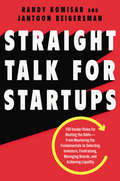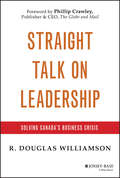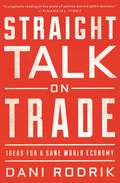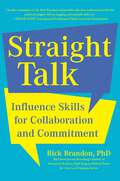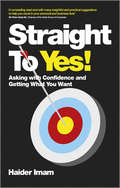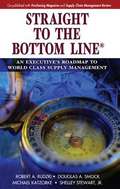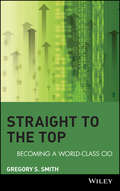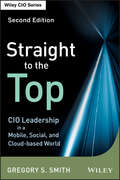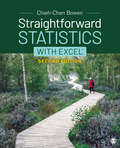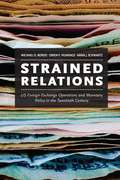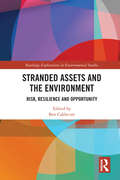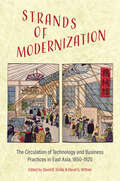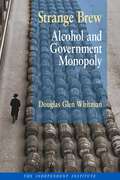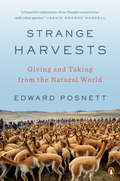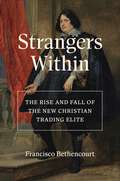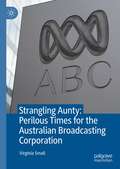- Table View
- List View
Straight Talk for Startups: 100 Insider Rules for Beating the Odds--From Mastering the Fundamentals to Selecting Investors, Fundraising, Managing Boards, and Achieving Liquidity
by Randy Komisar Jantoon Reigersman"Straight Talk for Startups memorializes age-old best practices and empowers both experienced and new investment professionals to beat the odds."—David Krane, CEO, Google Ventures"Straight Talk for Startups is filled with real, raw, and fact-based ‘rules of the road’ that you need to know when diving into our ultra-competitive startup world. A must read and a re-read!"—Tony Fadell, Coinventor of the iPod/iPhone & Founder of Nest LabsVeteran venture capitalist Randy Komisar and finance executive Jantoon Reigersman share no-nonsense, counterintuitive guidelines to help anyone build a successful startup.Over the course of their careers, Randy Komisar and Jantoon Reigersman continue to see startups crash and burn because they forget the timeless lessons of entrepreneurship.But, as Komisar and Reigersman show, you can beat the odds if you quickly learn what insiders know about what it takes to build a healthy foundation for a thriving venture. In Straight Talk for Startups they walk budding entrepreneurs through 100 essential rules—from pitching your idea to selecting investors to managing your board to deciding how and when to achieve liquidity. Culled from their own decades of experience, as well as the experiences of their many successful colleagues and friends, the rules are organized under broad topics, from "Mastering the Fundamentals" and "Selecting the Right Investors," to "The Ideal Fundraise," "Building and Managing Effective Boards," and "Achieving Liquidity."Vital rules you’ll find in Straight Talk for Startups include:The best ideas originate from founders who are usersCreate two business plans: an execution plan and an aspirational planNet income is an option, but cash flow is a factDon’t accept money from strangersPersonal wealth doesn’t equal good investingSmall boards are better than big onesAdd independent board members for expertise and objectivityToo many unanimous board decisions are a sign of troubleChoose an acquirer, don’t wait to be chosenLearn the rules by heart so you know when to break themFilled with helpful real-life examples and specific, actionable advice, Straight Talk for Startups is the ideal handbook for anyone running, working for, or thinking about creating a startup, or just curious about what makes high-potential ventures tick.
Straight Talk on Leadership
by R. Douglas WilliamsonAn urgent wake-up call--and radical action plan--for business leaders everywhereWhile it focuses primarily on Canadian business, this important book shares valuable insights of benefit to transformational business leaders everywhere. Without sugar coating his message, author R. Douglas Williamson, head of the prestigious consultancy, The Beacon Group, points to complacency, lack of leadership sophistication, and an inward focus as the chief reasons why Canadian companies are at risk of falling behind the rest of the world. Issuing an urgent call to action, Williamson helps leaders understand the four principle challenges facing the modern leader and describes the eight essential leadership competencies required to navigate the future. He provides powerful strategies, tools and techniques for how to reframe thinking about leadership and reform leadership strategies.Case Studies from The Beacon Group's wide and diversified client base include The Four Seasons, Scotiabank, Nortel Networks, Research in Motion, The Hudson's Bay Company, Export Development Canada, Holt Renfrew, and many others.An impassioned call to action for leaders everywhere combined with practical advice and tools to help leaders take up the responsibility of transformational leadership during a period of unprecedented change and monumental global challenges.One of the rare books to focus on Canadian business and business leadership, it explains why that country's competitiveness is in serious jeopardy and what can be done about it.
Straight Talk on Trade: Ideas for a Sane World Economy
by Dani RodrikAn honest discussion of free trade and how nations can sensibly chart a path forward in today’s global economyNot so long ago the nation-state seemed to be on its deathbed, condemned to irrelevance by the forces of globalization and technology. Now it is back with a vengeance, propelled by a groundswell of populists around the world. In Straight Talk on Trade, Dani Rodrik, an early and outspoken critic of economic globalization taken too far, goes beyond the populist backlash and offers a more reasoned explanation for why our elites’ and technocrats’ obsession with hyper-globalization made it more difficult for nations to achieve legitimate economic and social objectives at home: economic prosperity, financial stability, and equity.Rodrik takes globalization’s cheerleaders to task, not for emphasizing economics over other values, but for practicing bad economics and ignoring the discipline’s own nuances that should have called for caution. He makes a case for a pluralist world economy where nation-states retain sufficient autonomy to fashion their own social contracts and develop economic strategies tailored to their needs. Rather than calling for closed borders or defending protectionists, Rodrik shows how we can restore a sensible balance between national and global governance. Ranging over the recent experiences of advanced countries, the eurozone, and developing nations, Rodrik charts a way forward with new ideas about how to reconcile today’s inequitable economic and technological trends with liberal democracy and social inclusion.Deftly navigating the tensions among globalization, national sovereignty, and democracy, Straight Talk on Trade presents an indispensable commentary on today’s world economy and its dilemmas, and offers a visionary framework at a critical time when we need it most.
Straight Talk: Influence Skills for Collaboration and Commitment
by Rick BrandonThe costs of faulty communication are enormous for companies. Each year, billions of dollars are lost, precious time is wasted, innovation is thwarted, and morale suffers. But sharpening influence skills can address these challenges and create huge payoffs. Collaborative and commitment-driven interaction is the key to overcoming the obstacles of ever-rising performance expectations, widespread stress, and remote work. Drawing from 35 years of performance-improvement experience, Rick Brandon, PhD, trains thousands of people to improve their results and work relationships by improving the clarity and persuasiveness of their communication. Straight Talk is his &“edu-taining&” workshop-in-a-book for anyone who wants to develop direct, empathetic, and positive communication skills that will benefit themselves, their teammates, and their companies. It&’s common sense but not always common practice to work on improving interpersonal skills in order to achieve accountability and a more productive and harmonious work climate. Straight Talk shows how thoughtful changes to communication can create a ripple effect across teams and organizations. Each chapter is packed with practical tips, simple how-to instruction, real-world examples, involvement exercises, and humor, to help readers build positive influence skills with competence and confidence. Straight Talk hones core Assertive Speaking and Empathic Listening skills, and then funnels them into step-by-step formats for six vital workplace situations: Gaining Commitments, Advising and Guiding, Recognizing, Reminding, Constructively Confronting, and Challenging Ideas. Straight Talk will empower you to make interpersonal expertise your competitive advantage.
Straight Talk: Oral Communication for Career Success
by Paul R. Timm Sherron BienvenuStraight Talk: Oral Communication for Career Success has a fresh new approach that gives tools needed to communicate with confidence. This text provides a thorough overview and hands-on practice in the speech communication skills essential for life and work success. Whether talking person to person, in a group, or in front of an audience, plenty of practical applications give hands on experience in: practicing effective speaking, handling conversations, participating in teams, and gaining confidence in delivering formal and informal presentations. This book also helps students prepare for competitive events and includes the Presents the 5 Step Strategic Communication tactics students can immediately apply and practice communications skills.
Straight Talk: Written Communication for Career Success
by Paul R. Timm Sherron BienvenuStraight Talk: Written Communication for Career Success is a fresh new approach that gives tools needed to communicate with confidence. This text provides a thorough overview and hands-on practice in the written communication skills essential for life and work success. Whether writing person to person, or to a group, plenty of practical applications give hands on experience in: practicing effective writing, handling professional memos, participating in teams, and gaining confidence in delivering formal and informal professional documents. This book also helps students prepare for competitive events and includes a 5-Step Strategic Communication tactic which students can immediately apply and practice.
Straight and Level: Practical Airline Economics
by Stephen HollowayThis third edition of Straight and Level thoroughly updates the previous edition with extensive comments on recent industry developments and emerging business models. The discussion is illustrated by current examples drawn from all sectors of the industry and every region of the world. The fundamental structure of earlier editions, now widely used as a framework for air transport management courses, nonetheless remains unchanged. Part 1 of the book provides a strategic context within which to consider the industry's economics. Part 2 is built around a simple yet powerful model that relates operating revenue to operating cost; it examines the most important elements in demand and traffic, price and yield, output and unit cost. Part 3 probes more deeply into three critical aspects of capacity management: network management; fleet management; and revenue management. Part 4 concludes the book by exploring relationships between unit revenue, unit cost, yield, and load factor. Straight and Level has been written primarily for masters-level students on aviation management courses. The book should also be useful to final year undergraduates wanting to prepare for more advanced study. Amongst practitioners, it will appeal to established managers moving from functional posts into general management. More broadly, anyone with knowledge of the airline industry who wants to gain a deeper understanding of its economics at a practical level and an insight into the reasons for its financial volatility should find the book of interest.
Straight to Hell: True Tales of Deviance, Debauchery, and Billion-Dollar Deals
by John LeFevre"Some chick asked me what I would do with 10 million bucks. I told her I’d wonder where the rest of my money went.”-@GSElevatorOver the past three years, the notorious @GSElevator Twitter feed has offered a hilarious, shamelessly voyeuristic look into the real world of international finance. Hundreds of thousands followed the account, Goldman Sachs launched an internal investigation, and when the true identity of the man behind it all was revealed, it created a national media sensation—but that’s only part of the story.Where @GSElevator captured the essence of the banking elite with curated jokes and submissions overheard by readers, Straight to hell adds John LeFevre’s own story—an unapologetic and darkly funny account of a career as a globe-conquering investment banker spanning New York, London, and Hong Kong. Straight to Hell pulls back the curtain on a world that is both hated and envied, taking readers from the trading floors and roadshows to private planes and after-hours overindulgence. Full of shocking lawlessness, boyish antics, and win-at-all-costs schemes, this is the definitive take on the deviant, dysfunctional, and absolutely excessive world of finance.
Straight to Yes
by Haider ImamMAKE YOURSELF A "YES" MAGNETYou've finally plucked up the courage to ask for something. The afternoon off. A pay rise. Then comes that crucial moment where you wait with baited breath for the response. It's tense, but it doesn't have to be. You just need to master the art of 'the ask'.Taking a direct, light-hearted, wholly practical approach, Haider Imam zooms straight in on that moment of truth providing a set of proven tools and techniques for getting to 'yes,' every time. He instils readers with the confidence to ask bigger, more often and even ask for the impossible - and to get it. Based on sound psychological principles, Straight To Yes! offers tonnes of winning ways to make requests that get you to 'yes'Wholly practical in style and content, the book features accessible, straightforward techniques readers can put into action immediatelyDesigned for quick-reference while on the move, it affords instant access to specific, step-by-step, single-page techniques as needed
Straight to the Bottom Line™: An Executives Roadmap to World Class Supply Management
by Robert A. Rudzki Douglas A. Smock Michael Katzorke Shelley StewartStraight to the Bottom Line will enable senior corporate executives to turn the enormous top-line and bottom-line potential of supply chain and procurement into reality. Key Features --Provides a clear understanding of the performance improvement opportunities, and what is at stake if these opportunities are overlooked, written by and for senior corporate executives --Outlines a powerful and logical approach for assessing the state-of-the-art in their organization --Offers ways to estimate the specific opportunities related to implementing a change in strategy and practices --Details a comprehensive framework for organizing the transformation plan, across multiple dimensions --Gives advice on which areas to focus on first, in order to build and ensure success --WAV offers free downloadable resources such as a presentation detailing how modern supply management can improve ROIC and a lost opportunity calculator to quantify the impact of "maverick buying" — available from the Web Added Value Download Resource Center at jrosspub.com
Straight to the Top: Becoming a World-Class CIO (Wiley Cio Ser. #590)
by Gregory S. SmithYou have what it takes to be a CIO. Do you have a strategy for getting there? Now you do. "Gregory Smith has written the definitive work on how to achieve leadership success in IT. This well-written and carefully researched book is a must-read for any IT professional with aspirations toward the top IT spot. Years from now, seasoned IT leaders will be crediting Smith's book with playing a role in their success." —Martha Heller, Managing Director, IT Leadership Practice, Z Resource Group, and cofounder, CIO Executive Council "Wow! Put all the tips, advice, and strategies in this book to use now. The road to the top is rarely straight—follow Gregory's advice and the path will reveal itself to you!" —John R. Sullivan, CIO, AARP "While most professions have a distinct road map to the top, there is no standard career path to becoming a CIO. Smith addresses this unique challenge and provides aspiring CIOs with encouragement, advice, and essential skills based on years of his own and other CIOs' cumulative experience -- an important effort for the profession that Smith's fellow members in the CIO Executive Council embrace and applaud." —Mark Hall, General Manager of the CIO Executive Council "Teaching students what a CIO really does has been tough. We've had to choose between anecdotal treatments based on trade press articles and integrated academic frameworks that offer little in the way of lived experiences. Greg's book fixes that. By organizing interviews with leading technology executives, trade press reports, and his own experiences as a CIO, he provides an organized and comprehensive view of the job and its important role in modern organizations." —Fred Collopy, PHD, Professor and Chair of Information Systems and Professor of Cognitive Science, Case Western Reserve University
Straight to the Top: CIO Leadership in a Mobile, Social, and Cloud-based World (Wiley CIO #590)
by Gregory S. SmithEssential reading for IT professionals with aspirations toward the top IT spot, and for sitting CIOs looking to refine their mobile, social and cloud strategies and knowledge The definitive work on how to achieve leadership success in IT, Straight to the Top, Second Edition reveals how the role of the CIO is changing due to major trends associated with consumer and enterprise products and technologies driving new mobile solutions in today's organizations; cloud computing and the move away from controlled / internally managed data centers to pay as you use and elastic cloud infrastructure and application services; and the impact social media is having on today's complex organizations. Author Gregory S. Smith expertly coaches existing and aspiring CIOs on building the requisite skills through his observations and experience as a veteran CIO with more than twenty-five years of experience leading IT teams and delivering complex technical solutions in the information technology field. An invaluable guide to help information technology and business professionals recognize the qualities, skills, and expertise necessary to attain the role of a CIO or enhance the skills for sitting CIOs Equips IT managers, CIOs, and CTOs to strategically plan their career moves Packed with encouragement, advice, and essential skills for aspiring and sitting CIOs Features interviews with leading IT professionals, CIOs, and executive recruiting professionals Providing an organized and comprehensive view of the CIO job and its important role in modern organizations, Straight to the Top, Second Edition equips sitting CIOs and CIO candidates with the strategies and knowledge necessary to be successful in the new business normal - a mobile, social and cloud-based world, and how to provide technology leadership as a world-class CIO.
Straightforward Statistics with Excel®
by Chieh-Chen BowenWritten in an accessible and clear manner, Straightforward Statistics with Excel® 2e by Chieh-Chen Bowen helps students across the social and behavioral sciences gradually build their skills to develop a better understanding of the world around them. Each chapter purposefully connects with the previous chapter for a gradual accrual of knowledge from simple to more complex concepts. This effective, cumulative approach to statistics through logical transitions eases students into statistics and prepares them for success in more advanced quantitative coursework and their own research. The second edition now features Excel instructions and exercises throughout so students can use this widely-available and applied software for statistics. This book is designed to walk the reader through statistics at a steady but gentle pace, providing pop quizzes throughout every chapter so readers can check their knowledge along the way. By gradually stepping up difficulty in each chapter, students generate a solid foundation and are prepared for the next chapters. Straightforward Statistics with Excel looks at the big picture so that the basic statistical concepts connect to everyday and relevant research examples in multiple ways. Throughout the book the reader is reminded of what they need to be able to recall with "You Must Remember This" boxes. A rich source of practical resources are located at the end of chapters beginning with " What You Learned," followed by three sets of exercises so students can immediately apply their knowledge. The new edition features a reorganized presentation of material, starting with measures of central tendency, separating this from measures of variability so students better understand the differences. A more thorough presentation of one-sample and dependent samples t-tests gives students a stronger foundation in these crucial tests in statistics. New examples and studies complete the update, with a focus on simplicity. Throughout, the book makes use of Excel instructions and screenshots so students can take statistics with them through research projects and into the world beyond academia.
Straightforward Statistics with Excel®
by Chieh-Chen BowenWritten in an accessible and clear manner, Straightforward Statistics with Excel® 2e by Chieh-Chen Bowen helps students across the social and behavioral sciences gradually build their skills to develop a better understanding of the world around them. Each chapter purposefully connects with the previous chapter for a gradual accrual of knowledge from simple to more complex concepts. This effective, cumulative approach to statistics through logical transitions eases students into statistics and prepares them for success in more advanced quantitative coursework and their own research. The second edition now features Excel instructions and exercises throughout so students can use this widely-available and applied software for statistics. This book is designed to walk the reader through statistics at a steady but gentle pace, providing pop quizzes throughout every chapter so readers can check their knowledge along the way. By gradually stepping up difficulty in each chapter, students generate a solid foundation and are prepared for the next chapters. Straightforward Statistics with Excel looks at the big picture so that the basic statistical concepts connect to everyday and relevant research examples in multiple ways. Throughout the book the reader is reminded of what they need to be able to recall with "You Must Remember This" boxes. A rich source of practical resources are located at the end of chapters beginning with " What You Learned," followed by three sets of exercises so students can immediately apply their knowledge. The new edition features a reorganized presentation of material, starting with measures of central tendency, separating this from measures of variability so students better understand the differences. A more thorough presentation of one-sample and dependent samples t-tests gives students a stronger foundation in these crucial tests in statistics. New examples and studies complete the update, with a focus on simplicity. Throughout, the book makes use of Excel instructions and screenshots so students can take statistics with them through research projects and into the world beyond academia.
Strained Relations: US Foreign-Exchange Operations and Monetary Policy in the Twentieth Century (National Bureau of Economic Research Monograph)
by Michael D. Bordo Owen F. Humpage Anna J. SchwartzDuring the twentieth century, foreign-exchange intervention was sometimes used in an attempt to solve the fundamental trilemma of international finance, which holds that countries cannot simultaneously pursue independent monetary policies, stabilize their exchange rates, and benefit from free cross-border financial flows. Drawing on a trove of previously confidential data, Strained Relations reveals the evolution of US policy regarding currency market intervention, and its interaction with monetary policy. The authors consider how foreign-exchange intervention was affected by changing economic and institutional circumstances--most notably the abandonment of the international gold standard--and how political and bureaucratic factors affected this aspect of public policy.
Stranded Assets and the Environment: Risk, Resilience and Opportunity (Routledge Explorations in Environmental Studies)
by Ben CaldecottDrawing on the work of leading researchers and practitioners from a range of disciplines, including economic geography, economics, economic history, finance, law, and public policy, this edited collection provides a comprehensive assessment of stranded assets and the environment, covering the fundamental issues and debates, including climate change and societal responses to environmental change, as well as its origins and theoretical basis. The volume provides much needed clarity as the discourse on stranded assets gathers further momentum. In addition to drawing on scholarly contributions, there are chapters from practitioners and analysts to provide a range of critical perspectives. While chapters have been written as important standalone contributions, the book is intended to systematically take the reader through the key dimensions of stranded assets as a topic of research inquiry and practice. The work adopts a broad based social science perspective for setting out what stranded assets are, why they are relevant, and how they might inform the decision-making of firms, investors, policymakers, and regulators. The topic of stranded assets is inherently multi-disciplinary, cross-sectoral, and multi-jurisdictional and the volume reflects this diversity. This book will be of great relevance to scholars, practitioners and policymakers with an interest in include economics, business and development studies, climate policy and environmental studies in general.
Stranded With A Billionaire: Billionaire Boys Club 1 (Billionaire Boys Club)
by Jessica ClareFans of J.S. Scott, Louise Bay and Melody Anne - prepare to be dazzled by Jessica Clare's Billionaire Boys Club. The Billionaire Boys Club is a secret society of six incredibly wealthy men who have vowed success in business - at any cost. But success when it comes to love is a different matter...Billionaire Logan Hawkings needs a vacation. He's had a rough time after the death of his father and the betrayal of his fiancée. But with a visit to a recent business acquisition - a private island resort in the Bahamas - he has a chance to mend his broken heart. Bronte Dawson, a waitress from the Midwest, is stranded with the hotel's domineering yet sexy manager Logan. What's the harm in a little fling when it's just the two of them, alone in paradise? But she soon discovers there's more to Logan than he's told her...a billion times more. Now, Bronte's caught in a whirlwind affair with one of the world's most powerful men. But can their love endure their differences or will it all just blow over?Want more irresistible romance? Look for the rest of Billionaire Boys Club titles, as well as the sizzling spinoff series, Billionaires and Bridesmaids, starting with The Billionaire And The Virgin.
Strands of Modernization: The Circulation of Technology and Business Practices in East Asia, 1850–1920 (Japan and Global Society)
by David G. Wittner David B. SiciliaThe late nineteenth and early twentieth centuries saw extraordinary transfer and diffusion of industry- and transportation-related technology, and business methods. While most scholarship on nineteenth-century technology transfer beyond Europe and North America has focused on the West-to-East movement of artifacts, skills, and knowledge, Strands of Modernization considers the transfer of technology and business methods within East Asia in the period between approximately 1850 and 1920. Highlighting currents moving in multiple directions, contributors expand upon conventional notions of what qualifies as a "technology" or a "business practice," looking more broadly at skills, systems of technology, tacit knowledge, and the ideologies and other belief systems with which they interact. The core ambition driving Strands of Modernization is to illuminate processes of adaption, versus adoption, that occur when technology and business practices cross sociocultural boundaries.
Strange Brew: Alcohol and Government Monopoly
by Glen WhitmanAfter Prohibition ended in 1933, many states passed laws regulating the sale of alcoholic beverages, now known as Franchise Termination Laws. Ostensibly intended to protect wholesalers from shady suppliers, and the public from the harmful effects of alcohol, these laws in fact created government-protected monopolies.In Strange Brew, one of the first studies of this topic, economist Douglas Glen Whitman subjects these laws to critical scrutiny. Strange Brew demonstrates that the &“monopoly protection laws&” in the alcoholic beverage industry reflect powerful special interests in the political process who use such measures to restrict markets, shield themselves from competition and consumer preferences, and set higher prices with relative impunity. It also shows how the notion that alcohol consumption is a &“sin&” in need of legal restraint substitutes the choices and moral judgment of politicians for that of consumers.
Strange Harvests: The Hidden Histories of Seven Natural Objects
by Edward PosnettAn original and magical map of our world and its riches, formed of the stories of the small-scale harvests of seven natural objectsIn this beguiling book, Edward Posnett journeys to some of the most far-flung locales on the planet to bring us seven wonders of the natural world--eiderdown, vicuña fiber, sea silk, vegetable ivory, civet coffee, guano, and edible birds' nests--that promise ways of using nature without damaging it. To the rest of the world these materials are mere commodities, but to their harvesters they are imbued with myth, tradition, folklore, and ritual, and form part of a shared identity and history.Strange Harvests follows the journeys of these uncommon products from some of the most remote areas of the world to its most populated urban centers, drawing on the voices of the people and little-known communities who harvest, process, and trade them. Blending history, travel writing, and interviews, Posnett sets these human stories against our changing economic and ecological landscape. What do they tell us about capitalism, global market forces, and overharvesting? How do local microeconomies survive in a hyperconnected world? Is it possible for us to live together with different species? Strange Harvests makes us see the world with wonder, curiosity, and new concern.
Strangers Within: The Rise and Fall of the New Christian Trading Elite
by Francisco BethencourtA comprehensive study of the New Christian elite of Jewish origin—prominent traders, merchants, bankers and men of letters—between the fifteenth and eighteenth centuriesIn Strangers Within, Francisco Bethencourt provides the first comprehensive history of New Christians, the descendants of Jews forced to convert to Catholicism in late medieval Spain and Portugal. Bethencourt estimates that there were around 260,000 New Christians by 1500—more than half of Iberia&’s urban population. The majority stayed in Iberia but a significant number moved throughout Europe, Africa, the Middle East, coastal Asia and the New World. They established Sephardic communities in North Africa, the Ottoman Empire, Italy, Amsterdam, Hamburg and London. Bethencourt focuses on the elite of bankers, financiers and merchants from the fifteenth to the eighteenth centuries and the crucial role of this group in global trade and financial services. He analyses their impact on religion (for example, Teresa de Ávila), legal and political thought (Las Casas), science (Amatus Lusitanus), philosophy (Spinoza) and literature (Enríquez Gomez).Drawing on groundbreaking research in eighteen archives and library manuscript departments in six different countries, Bethencourt argues that the liminal position in which the New Christians found themselves explains their rise, economic prowess and cultural innovation. The New Christians created the first coherent legal case against the discrimination of a minority singled out for systematic judicial inquiry. Cumulative inquisitorial prosecution, coupled with structural changes in international trade, led to their decline and disappearance as a recognizable ethnicity by the mid-eighteenth century. Strangers Within tells an epic story of persecution, resistance and the making of Iberia through the oppression of one of the most powerful minorities in world history. Packed with genealogical information about families, their intercontinental networks, their power and their suffering, it is a landmark study.
Strangers and Neighbors
by Andrea M. VoyerThe city of Lewiston, Maine, has struggled since its mills began closing in the 1950s. In the new millennium Lewiston acquired a new identity as 'Maine's Mogadishu'. Beginning in 2001, substantial Somali immigrant settlement gave Lewiston the largest per capita Somali population in the United States and sparked controversies and collaborations that redefined the city. In Strangers and Neighbors, Andrea M. Voyer shares five years of observations in the city of Lewiston. She shows how long-time city residents and immigrant newcomers worked to develop an understanding of the inclusive and caring community in which they could all take part. Yet the sense of community developed in Lewiston was built on the appreciation of diversity in the abstract rather than by fostering close and caring relationships across the boundaries of class, race, culture, and religion. Through her sensitive depictions of the experiences of Somalis, Lewiston city leadership, anti-racism activists, and even racists, Voyer reveals both the promise of and the obstacles to achieving community in the face of diversity.
Strangers at the Gates: New Immigrants in Urban America
by Roger David WaldingerStrangers at the Gates looks at the connection between urban fates and immigrant destinies, asking about the prospects for progress in the capitals of immigrant America, and inquiring into the conditions that will hinder or aid the newest Americans in their quest to get ahead.
Strangers on Familiar Soil
by Edward Dallam MelilloThis groundbreaking history explores the many unrecognized, enduring linkages between the state of California and the country of Chile. The book begins in 1786, when a French expedition brought the potato from Chile to California, and it concludes with Chilean president Michelle Bachelet's diplomatic visit to the Golden State in 2008. During the intervening centuries, new crops, foods, fertilizers, mining technologies, laborers, and ideas from Chile radically altered California's development. In turn, Californian systems of servitude, exotic species, educational programs, and capitalist development strategies dramatically shaped Chilean history. Edward Dallam Melillo develops a new set of historical perspectives--tracing eastward-moving trends in U. S. history, uncovering South American influences on North America's development, and reframing the Western Hemisphere from a Pacific vantage point. His innovative approach yields transnational insights and recovers long-forgotten connections between the peoples and ecosystems of Chile and California.
Strangling Aunty: Perilous Times for the Australian Broadcasting Corporation
by Virginia SmallDrawing on a wealth of academic research, statistics and interviews with key Australian media people including present and former Australian Broadcasting Corporation staffers, this book explores the transitions of the ABC under various types of organisational re-strategising, governance and political shifts.The book provides the reader with an authoritative narrative as to how the ABC has lost its iconic status in Australian society, and unfolds how the ABC has strayed from its respected public charter which endowed the ABC with a distinctive and important role in informing, educating and entertaining the Australian public. Successive federal government funding cuts have shrunk staffing levels and services while it has pursued a corporatist model that mimics the trappings and practices of commercial media. In that process it has become politicised and trivialised, thereby threatening its demise. The book is a unique and timely contribution at a time of dwindling interest for the funding of public assets everywhere. There is no other book in the market that addresses the decline of the organisation (the ABC) and analyses the reasons for its demise within an organisational theoretical framework. The book is written for an educated general audience, with academics and media practitioners specifically in mind, and has everyday applications for business organisations operating in the public sector by bringing together important findings of public funding, budgets, management and organisational strategies and evolution.
